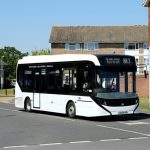Operators must lobby councils for support, recommends Vendigital Director Phil Bulman
As well as proposing to ban the sale of new petrol and diesel cars and vans by 2040, the Government’s air quality plan announced a £255m fund to help towns and cities implement clean air initiatives.
But will bus operators benefit, and what can you do to ensure that this is the case?
Get involved now
With local authorities (LAs) responsible for deciding how to spend money, operators must become involved in discussions at an early stage to secure the support needed.
If you fail to do this, there is a risk of funds being allocated to other projects, such as traffic management schemes.
With hybrid buses costing at least £250,000 each, it is clear that they can only form part of the solution.
If LAs decide to establish more clean air zones, operators would be disadvantaged by being asked to invest in high-value assets and unfamiliar technology at short notice.
One of the main concerns is the likely lack of consistency in the approach taken by local authorities to support clean air initiatives and uncertainty over which technologies – CNG, electric, hydrogen or other types – will be favoured.
With the Government failing in terms of advising on best practice, there is a real risk that LAs will favour different approaches. This will make it even more uncertain for operators as you can’t be sure that retrofitting older vehicles, or investing in new Euro 6 vehicles, will be money well spent.
Leeds example
A partnership approach in Leeds is an example of best practice in terms of a broad, LA-led plan to tackle air pollution. A £180m transport improvement scheme, supported by Leeds City Council, the DfT and First West Yorkshire, has improved air quality, boosted revenues and improved services.
It uses initiatives aimed at decreasing car journeys and encouraging public transport use.
Operators could find similar collaborations will be possible in their area, but you should get in early and open discussions with LAs as soon as possible.
If you are hanging your hopes on a scrappage scheme (similar to cars), then the high-cost outlay and typical 15-year depreciation means it is unlikely that such schemes would be viable.
Lower your risks
To mitigate the risks associated with LAs changing their strategies, operators could consider leasing, rather than buying, low-emission vehicles. Adapting services to a more flexible, ‘demand-responsive’ basis, could enhance profitability, while staying focused on enhancing the passenger experience.
While a more joined-up, multi-city approach is required to tackle air pollution, it is by no means certain that LAs will act in this way.
Therefore, the onus is on operators to secure the best deal possible by making their voice heard. Industry bodies such as the CPT and ALBUM also have a role to play.
By getting in early and creating partnerships with manufacturers and other private and public sector partners, operators will be better-placed to secure some of the funding they might need for a smooth and profitable transition to a low-emissions future.
Find out more: www.vendigital.com

























